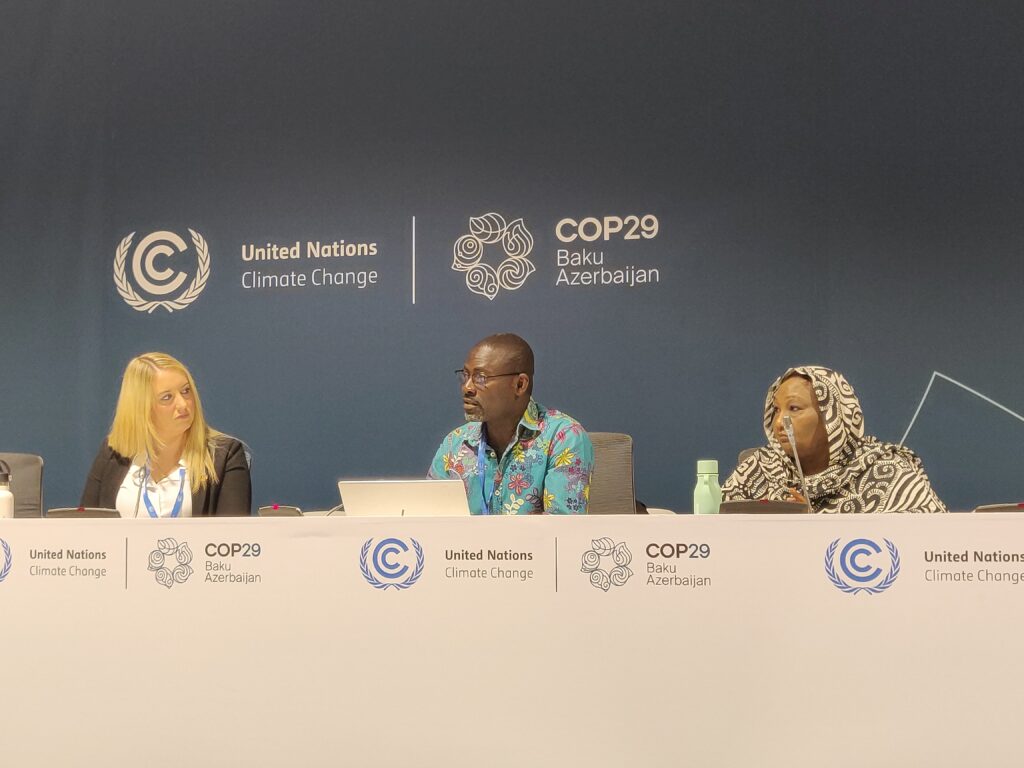Reflections from COP29 – By Adessou Kossivi, GNDR Regional Lead for Africa, and Rebecca Murphy, GNDR Policy Lead.
Progress and pitfalls: key outcomes from COP29
The recently concluded COP29 in Baku, Azerbaijan, offered a mixed bag of progress and persistent challenges for global climate action. For local civil society organisations (CSOs) and frontline communities, the summit highlighted urgent needs and glaring gaps in support. While world leaders celebrated a landmark $300 billion annual climate finance pledge, overall the summit failed to meet the profound and escalating demands of the climate crisis. Deadlock over negotiating the Nationally Determined Contributions (NDCs – climate action plans submitted by each country under the Paris Agreement) and mitigation targets signalled a worrying lack of urgency, leaving grassroots communities to grapple with the consequences of inaction.
GNDR’s advocacy at COP29: Local solutions for a global crisis
GNDR’s advocacy at COP29 emphasised three key calls to action: ensuring urgent funding for the loss and damage fund, empowering frontline communities with the resources they need for resilience, and amplifying civil society voices in climate policymaking. These messages resonated across various high profile side events, where GNDR members and partners brought critical local perspectives to the global stage. From the official high-level discussion on financing loss and damage at the local level to the ODI Pavilion session showcasing member expertise, GNDR successfully highlighted the importance of localised, inclusive and justice-centred climate solutions.
Despite these achievements, significant challenges loom large. The exclusion of loss and damage financing from the New Collective and Quantified Goals (NCQG) framework exposed a persistent unwillingness to prioritise the needs of vulnerable nations. Weak language on phasing out fossil fuels has left many questioning the effectiveness of the COP process. For GNDR members, this lack of progress reinforces the need to advocate for systemic changes that prioritise local expertise, equitable financing, and meaningful community participation.
The road to COP30: Prioritising accountability and frontline voices
COP29 also raised questions about the structure and effectiveness of global climate negotiations in delivering justice. Many GNDR members expressed frustrations with a process that often prioritises geopolitical interests over science and the lived realities of frontline communities. A palpable decline in civil society presence and activism at Baku reflected growing constraints on civic space, limiting opportunities for local voices to influence global decisions. GNDR advocates for a rethinking of the COP process – one that centres inclusivity, transparency and equity in decision-making.
As the focus shifts to COP30, GNDR remains committed to holding decision-makers accountable and championing the voices of those most affected by the climate crisis. The road ahead requires stronger commitments, ensuring climate finance reaches local actors, and safeguarding civic spaces for real, meaningful advocacy. With frontline communities at the helm, GNDR will continue to fight for a climate framework that delivers real solutions to those most in need.
